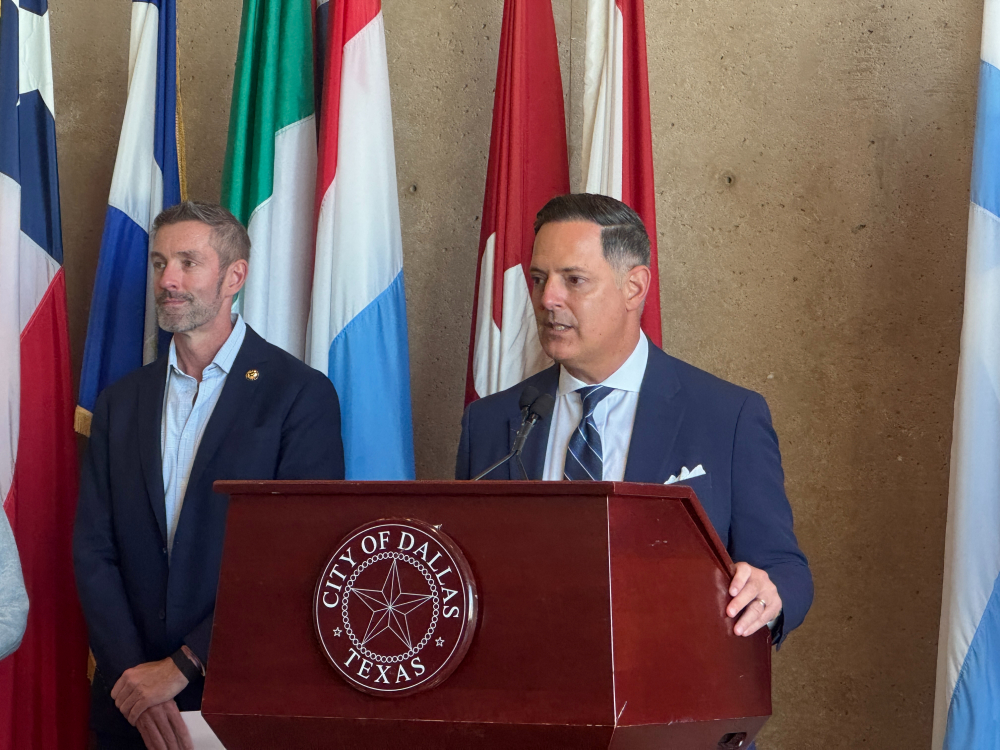
Alyssa Fields

Audio By Carbonatix
The Dallas City Council unanimously approved changing the election cycle for selecting the next City Council, moving it from May to November starting in 2027.
The effort, made possible by years of work from a group of Dallas lawmakers and advocates, passed 15-0, a surprise to those who had led the charge.
“We did not think it was going to happen,” said council member Chad West. “Literally about an hour ago, I didn’t think it was going to happen.”
West credits the diligent work of state Rep. Rafael Anchia and state Sen. Nathan Johnson, who were instrumental in passing a bill that allows political divisions, including municipalities, to elect to move the date of their general elections. The legislative effort followed the wide support of Proposition D in the November 2024 election, which removed the requirement for May elections from the city’s charter. The proposition passed with 65%, or 231,000, voters voting in favor,
The change aims to increase voter participation by saving voters a trip, allowing Dallas residents to check all boxes in one go.
“When you have enhanced participation, you strengthen democracy. Period. Full stop,” said Anchia at a press release immediately following the vote.
Anchia and West referenced Dallas’ abysmally low voter turnout, which is among the worst of any major city in the country.
“That is a crisis. That is a problem,” Anchia said.
The Driving Force
Behind the curtain, David de la Fuente, who once served as West’s volunteer campaign manager, has been the hand moving the needle on changing the election dates for years. Passing de la Fuente’s No. 1 priority took hundreds of emails, countless hours spent at City Hall and unimaginable amounts of research and advocacy to finally see success.
“I’ve been spamming your inboxes with these for the last four years on this issue. I appreciate you all putting up with me,” he said to the council before the vote. “… This is a task I took upon myself to not let die. To not take no for an answer. You 15 have the power to fix an old mistake in our election system. The people voted and asked you to change it.”
The father of two and political analyst holds limited sway in the political sphere. Other than being adamant and informed, de la Fuente is just a concerned citizen, making the achievement all the more impressive.
“I’m at a loss for words after four years of yapping nonstop about this,” he said at the press conference. “I think this is a lesson for anyone in the city of Dallas that if you identify a problem here in our great city and you take it upon yourself to make sure it’s fixed for not only yourself, for your family and for all other city residents, you can make a difference in our community. If I had to do this alone, I would have failed. I would have failed spectacularly.”
Although the measure passed without much resistance, some council members questioned the complicated timing issues that would arise in the next election cycle. When the next council takes its seats in 2027, the city’s budget, which is workshopped in August, will already have been approved, meaning the new council will have limited context.
Councilmember Adam Bazaldua joked that the next generation of fresh faces to the council will be staring down a slew of newly approved propositions and charter changes before they even know where the bathrooms at City Hall are.
Other concerns raised were the extension of the term for the current council. Moving the election to November immediately grants its members an extra six months of service.
But the hesitation was not enough to create significant roadblocks, especially when lawmakers brought up Dallas’ favorite thing, saving taxpayers money.
“I’m confident with today’s vote, we’re going to turn [voter participation] around,” West said. “We know that November elections will also mean more early election days and more locations to come. Lastly, this move [will save] city taxpayers half a million dollars every two years, resulting in millions of dollars in the future.”